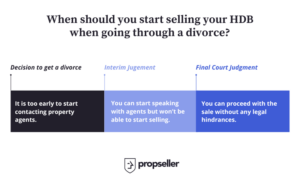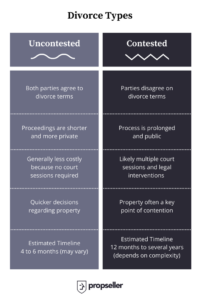Navigating the intricacies of life can be challenging, especially when faced with unexpected events like a divorce. One of the prominent questions we often receive is: “How long to sell HDB flat after divorce?”
This, among many others, highlights the uncertainty and anxiety many face when dealing with selling a house after divorce. It’s not just about the logistics of selling property after divorce; it’s also about understanding the HDB divorce scheme, divorce house rights, and deciphering the intricacies of real estate agent divorce provisions.
Let’s break it down together.
👉🏻 If you don’t have the time to read the whole guide, we’ve provided a succinct, high-level summary for you.
Table of contents:
- Timing the HDB Sale: Before or After Final Court Judgement (FCJ)?
- The Impact of Divorce Types on Timeline
- The Step-by-Step Sale Process Post-FCJ
- Final Thoughts
Timing the HDB Sale: Before or After Final Court Judgement (FCJ)?
The FCJ is a pivotal point in this process of selling an HDB during a divorce. This legal document represents not just the official end of a marriage but also the definitive decisions around the division of assets, including property. Its importance cannot be overstated, as it provides clear directives on how and when properties can be sold or ownership transferred.
As such, when mapping out the timeline for property sales post-divorce, the issuance of the FCJ is a pivotal milestone and marks the point at which you can initiate your sales process
Here are guidelines to help you time when to contact a property agent in this context:
Before the Interim Judgement (IJ)
You may contact an agent before you get the IJ, however, it is not recommended as it is too early in the process to do so.
At the preliminary stage of the divorce proceedings, it is too early to engage in conversations with an agent, given that several aspects of your matrimonial assets have not been finalized by the court. It’s advisable to wait until there’s more clarity regarding the distribution of assets, cash proceeds, and decisions on the mandated sale.
After the IJ but before the FCJ
By this stage, you likely have a clearer picture of where things stand, especially concerning property matters. Starting initial conversations with an agent at this point allows you to get everything lined up for a sale, so once the FCJ is granted, you can hit the ground running.
However, there still remains a level of uncertainty until the FCJ is granted, and the ancillary matters are settled.
After the FCJ
This is the best time to meet with up a property agent and engage their services as you have full clarity on the court’s decision regarding the property. There’s no ambiguity, and you can proceed with the sale without any legal hindrances.
Propseller’s recommendation
For those who prefer to be proactive, reaching out to property agents after the Interim Judgment but before the FCJ can strike a good balance between preparation and certainty. This allows you to gauge the market, get valuable insights, and be sale-ready, while also being reasonably sure of the impending sale. However, if you’re risk-averse and wish to avoid any potential complications, waiting until after the FCJ is the safest option.
Regardless of when you decide to contact an agent, ensure you choose one who understands the complexities and sensitivities of selling property during a divorce, like Propseller, who has vast experience assisting divorce clients in their property journey.

The Impact of Divorce Types on Timeline
Even though we’ve provided guidelines on the best time to contact an agent, it’s important to note that various factors may impact property sales timelines: market conditions, property location, your urgency to sell, to name a few.
One key aspect that impacts the timeline for sales is whether the divorce is contested or uncontested. This factor will determine how soon you’ll receive the FCJ, which is crucial to timing your property sale correctly.
Uncontested vs. Contested Divorce: What’s the Difference?
Uncontested Divorce
This is where both parties agree to the terms of the divorce. The proceedings are shorter, more private, and generally less costly. Both parties can agree on asset division, including how to handle property sales. However, the court’s final judgment remains the decisive factor, especially when considering the fairness of asset distribution.
Contested Divorce
In scenarios where disagreements arise, unfortunately, the process becomes more prolonged and public. Both parties present plans for matrimonial property and child parenting. If no middle ground is found outside the courtroom, the fate of the property hinges on the court’s final judgment.

Use Case #1: The divorce is uncontested
Implications on the sales timeline
In cases where both parties agree to the divorce terms, the process is typically smoother. Mutual consent can lead to quicker decisions regarding the property, whether it’s about selling, ownership transfer, or splitting the proceeds. Because of this harmonious agreement, the time required to put the property on the market and subsequently close a deal can be considerably reduced. With fewer disagreements and delays, an uncontested divorce often allows the property to be listed and sold more swiftly.
Estimated divorce timeline
Here’s a typical timeline of an uncontested divorce:
- Filing for Divorce: Once the necessary documents are filed, the other party (the Defendant) has 8 days to file a Memorandum of Appearance if they wish to contest. If they don’t, it remains uncontested.
- Interim Judgment (IJ): If everything is in order and the divorce remains uncontested, the court will grant an Interim Judgment, which provisionally certifies the dissolution of marriage. This can be obtained relatively quickly, usually within 1 to 2 months of filing.
- Final Judgment (FCJ): Following the Interim Judgment, there’s a mandatory three-month waiting period. After this, if all ancillary matters are settled and documents filed accordingly, the Final Judgment can be applied for. The FCJ, in most uncomplicated and truly uncontested cases, can be obtained shortly after this waiting period.
All in all, getting the FCJ in an uncontested divorce in Singapore can take about 4 to 6 months from the date of filing. Of course, this can vary based on individual circumstances, court schedules, and administrative processes. It’s essential to consult with a family lawyer to get a clearer understanding of the expected timeline for any specific case.
Use Case #2: The divorce is contested
Implications on the sales timeline
A contested divorce, marked by disagreements, can significantly elongate the process overall. The property often becomes a key point of contention, requiring multiple court sessions and legal interventions to reach a resolution. Even after a final court judgment is obtained, lingering disputes can further delay listing the property or accepting offers. The extended legal proceedings and potential for prolonged negotiations make the sale timeline in contested divorces unpredictable and generally lengthier.
Estimated divorce timeline
A contested divorce is certainly more intricate and time-consuming. Here’s a general timeline for a contested divorce in Singapore:
- Filing for Divorce: After the necessary papers are filed, the other party (the Defendant) has 8 days to file a Memorandum of Appearance to indicate they wish to contest the divorce or the terms. If they do, the divorce proceedings move into the contested realm.
- Pre-Trial Conferences: The court schedules pre-trial conferences to help parties iron out disagreements. This can extend over several months based on the number of issues and their complexity.
- Trial: If parties still cannot agree, the case moves to a trial. Depending on the complexities, the trial can last from a day to several days or even longer. It could be many months after filing before a trial commences.
- Interim Judgment (IJ): After the trial, if the court decides in favor of the divorce, an Interim Judgment is granted. This provisionally certifies the dissolution of marriage.
- Ancillary Matters Hearing: After the IJ, the court will deal with ancillary matters like child custody, property division, and spousal support. These hearings can further prolong the process by several months, especially if there are numerous disputes.
- Final Judgment (FCJ): Once ancillary matters are resolved, there’s a mandatory three-month waiting period before applying for the Final Judgment. After this period, the FCJ can be issued, finalizing the divorce.
Considering all the variables and potential complexities, getting the FCJ in a contested divorce can take anywhere from 12 months to several years. Again, this timeline is general, and individual cases might differ significantly based on specific circumstances. Consulting a family lawyer will provide a more tailored estimate for the expected duration of a particular case.
The Step-by-Step Sale Process Post-FCJ
It goes without saying that, before embarking on the property selling journey, it’s crucial to ensure you’ve met all standard eligibility conditions such as the MOP (Minimum Occupation Period) and EIP/SPR quotas.
Once the FCJ is in hand, the selling process becomes more streamlined.
- Engage with an Agent: Find a knowledgeable agent, ideally someone with experience in divorce sales. They should offer insights about your property and the current market, providing a comprehensive property valuation.
- Sign an Agreement: Once you’re confident in your choice of agent, formalize the partnership with an agreement.
- Listing Distribution: A good agent will make your property shine. Expect professional photos, 3D tours, compelling descriptions, and strategic posting on more than one major property portals. They should also boost the listing regularly for greater visibility.
- Property Viewings: Potential buyers will want to see the property firsthand. Coordinate with your agent to schedule these viewings. Favour agencies that are able to provide both virtual and physical viewings: this will save you time in meeting only with qualified prospects.
- Receiving and Negotiating Offers: Once offers come in, your agent should have excellent negotiation skills to get you the best possible deal.
- Finalization: After agreeing on an offer, your agent will handle most of the paperwork, guiding you through to the final sale.
Remember, every property sale is unique, especially during sensitive situations like divorce. Choose partners who understand and respect your needs throughout the process.
Final Thoughts
As the complexities of divorce intertwine with property sales, it’s essential to be well-informed and prepared. Propseller is here to offer guidance, ensuring that in even the toughest times, you’re not alone. Making informed property decisions is crucial, and we’re ready to assist every step of the way.
Contact us for a FREE consultation with one of our agents – no obligation!